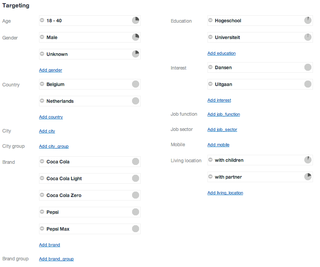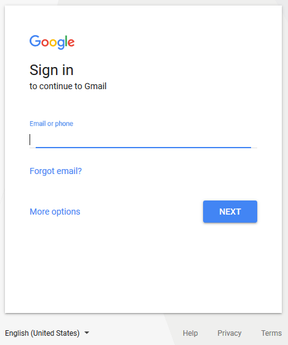Related Research Articles
An email address identifies an email box to which messages are delivered. While early messaging systems used a variety of formats for addressing, today, email addresses follow a set of specific rules originally standardized by the Internet Engineering Task Force (IETF) in the 1980s, and updated by RFC 5322 and 6854. The term email address in this article refers to just the addr-spec in Section 3.4 of RFC 5322. The RFC defines address more broadly as either a mailbox or group. A mailbox value can be either a name-addr, which contains a display-name and addr-spec, or the more common addr-spec alone.

Gmail is a free email service provided by Google. As of 2019, it had 1.5 billion active users worldwide making it the largest email service in the world. It also provides a webmail interface, accessible through a web browser, and is also accessible through the official mobile application. Google also supports the use of third-party email clients via the POP and IMAP protocols.
Internet privacy involves the right or mandate of personal privacy concerning the storage, re-purposing, provision to third parties, and display of information pertaining to oneself via the Internet. Internet privacy is a subset of data privacy. Privacy concerns have been articulated from the beginnings of large-scale computer sharing and especially relate to mass surveillance.
Online advertising, also known as online marketing, Internet advertising, digital advertising or web advertising, is a form of marketing and advertising which uses the Internet to promote products and services to audiences and platform users. Online advertising includes email marketing, search engine marketing (SEM), social media marketing, many types of display advertising, and mobile advertising. Advertisements are increasingly being delivered via automated software systems operating across multiple websites, media services and platforms, known as programmatic advertising.
Web analytics is the measurement, collection, analysis, and reporting of web data to understand and optimize web usage. Web analytics is not just a process for measuring web traffic but can be used as a tool for business and market research and assess and improve website effectiveness. Web analytics applications can also help companies measure the results of traditional print or broadcast advertising campaigns. It can be used to estimate how traffic to a website changes after launching a new advertising campaign. Web analytics provides information about the number of visitors to a website and the number of page views, or create user behavior profiles. It helps gauge traffic and popularity trends, which is useful for market research.
Emailtracking is a method for monitoring whether the email message is read by the intended recipient. Most tracking technologies use some form of digitally time-stamped record to reveal the exact time and date when an email is received or opened, as well as the IP address of the recipient.

Google Analytics is a web analytics service offered by Google that tracks and reports website traffic and also the mobile app traffic & events, currently as a platform inside the Google Marketing Platform brand. Google launched the service in November 2005 after acquiring Urchin.

HTTP cookies are small blocks of data created by a web server while a user is browsing a website and placed on the user's computer or other device by the user's web browser. Cookies are placed on the device used to access a website, and more than one cookie may be placed on a user's device during a session.

Targeted advertising is a form of advertising, including online advertising, that is directed towards an audience with certain traits, based on the product or person the advertiser is promoting. These traits can either be demographic with a focus on race, economic status, sex, age, generation, level of education, income level, and employment, or psychographic focused on the consumer values, personality, attitude, opinion, lifestyle and interest. This focus can also entail behavioral variables, such as browser history, purchase history, and other recent online activities. The process of algorithm targeting eliminates waste.
Mobile web analytics studies the behaviour of mobile website users in a similar way to traditional web analytics. In a commercial context, mobile web analytics refers to the data collected from the users who access a website from a mobile phone. It helps to determine which aspects of the website work best for mobile traffic and which mobile marketing campaigns work best for the business, including mobile advertising, mobile search marketing, text campaigns, and desktop promotion of mobile sites and services.
Behavioral retargeting is a form of online targeted advertising by which online advertising is targeted to consumers based on their previous internet behaviour. Retargeting tags online users by including a pixel within the target webpage or email, which sets a cookie in the user's browser. Once the cookie is set, the advertiser is able to show ads to that user elsewhere on the internet via an ad exchange.

The Gmail interface makes Gmail unique amongst webmail systems for several reasons. Most evident to users are its search-oriented features and means of managing e-mail in a "conversation view" that is similar to an Internet forum.
Web tracking is the practice by which operators of websites and third parties collect, store and share information about visitors’ activities on the World Wide Web. Analysis of a user's behaviour may be used to provide content that enables the operator to infer their preferences and may be of interest to various parties, such as advertisers. Web tracking can be part of visitor management.
Epic is a proprietary privacy-centric web browser. It was developed by Hidden Reflex, a software product company founded by Alok Bhardwaj, using Chromium source code. Epic is always in private browsing mode, and exiting the browser deletes all browser data. The browser's developers claim that Google's tracking code has been removed, and that blocks other companies from tracking the user.
Site retargeting is a display advertising technique used by marketers to display advertising to people who have previously visited their website. The marketer includes a pixel within their webpage which sets a cookie in the user's browser. That cookie allows the marketer to target the website visitor with advertising elsewhere on the internet using retargeting.
Ghostery is a free and open-source privacy and security-related browser extension and mobile browser application. Since February 2017, it has been owned by the German company Cliqz International GmbH. The code was originally developed by David Cancel and associates.
A web beacon is a technique used on web pages and email to unobtrusively allow checking that a user has accessed some content. Web beacons are typically used by third parties to monitor the activity of users at a website for the purpose of web analytics or page tagging. They can also be used for email tracking. When implemented using JavaScript, they may be called JavaScript tags.
Email remarketing refers to the email systems used by merchants to follow up with website visitors who do not make a desired purchase action. It is a development of email marketing that aims to re-attract website viewers or customers. In other words, the whole idea of email remarketing is attracting customers or users back for purchase, growing repeated customers.
Google's changes to its privacy policy on March 16, 2012, enabled the company to share data across a wide variety of services. These embedded services include millions of third-party websites that use AdSense and Analytics. The policy was widely criticized for creating an environment that discourages Internet-innovation by making Internet users more fearful and wary of what they do online.
Spy pixels or tracker pixels are hyperlinks to remote image files in HTML email messages that have the effect of spying on the person reading the email if the image is downloaded. They are commonly embedded in the HTML of an email as small, imperceptible, transparent graphic files. Spy pixels are commonly used in marketing, and there are several countermeasures in place that aim to block email tracking pixels. However, there are few regulations in place that effectively guard against email tracking approaches.
References
This article needs additional citations for verification .(July 2016) |
- ↑ "Google Quietly Updates Gmail to Cache Images: Impact for Email Marketers". 31 December 2013.